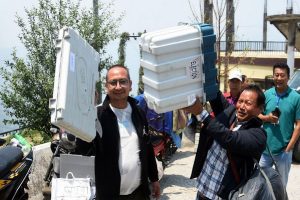Afghanistan, India and Pakistan are three states, intrinsically linked, facing varying levels of militancy. Each country blames the other for supporting groups inimical to it. Politically the nations have grown so apart that resolution of any crisis appears unlikely. The summer is yet to set in, passes yet to reopen, movement of militants across borders still to commence in earnest; thus probably a violent period is ahead for security agencies and
people.
Afghanistan is rattled by militants belonging to some eight groups, the most prominent being the Taliban and the ISIS. The summer offensive launched by the Taliban in 2016 was the worst in Afghanistan’s history as casualties – civil and military – were high. The Taliban hierarchy is based in Quetta, Pakistan. The area that it controls in rural Afghanistan increased marginally in 2016 as compared to previous years. As a prelude to its 2017 summer offensive, the Taliban captured the opium rich Sangin district of Helmand Province last week.
The ISIS has begun expanding its footprint and along the way has inducted fighters of the Pakistan Taliban (TTP). While it has launched few open operations, it has announced its enlarged presence by suicide attacks in crowded areas and by targeting remote military posts. Afghanistan blames Pakistan for harbouring and supporting the Taliban.
Pakistan on the other hand, faces the brunt of terror strikes spearheaded by the TTP and its breakaway factions. The ISIS has also established a foothold and claimed responsibility for suicide attacks on minority communities. The crescendo against the strikes rose to such levels that the army was compelled to deploy artillery and air power on the Afghan border to destroy terror camps near and in Afghanistan. Operation Radd-ul-Fasaad, the latest in a series of operations against terror groups was launched in February across the country. It shut its borders with Afghanistan, pushed back Afghan refugees and launched air and artillery barrages across the border. It has announced its intention to fence its border with Afghanistan, an action which may not be effective considering India’s experience with border fencing.
Pakistan always accuses India and Afghanistan of acting in concert to destabilize the country. While the groups are based in Afghanistan, direct support by Afghan intelligence agencies has never been proved. Similarly, Indian support to the groups remains a conjecture by Pakistan without any proof.
India faces militancy mainly in Kashmir and to a more controlled extent in the North-east, with Kashmir being openly supported by the Pakistani deep state. It also has the tacit support of separatists in Kashmir, who continue to incite the population against the Indian state. The past summer was a violent one in the valley, after the encounter killing of local militant leader Burhan Wani. It resulted in more than 80 local youth joining the militancy, the largest in the recent past. India has proof of Pakistani involvement in Kashmir.
Supporting terror groups in neighbouring countries of the region is of national interest and linked to national strategy, hence unlikely to be easily discarded. Pakistan has always considered Afghanistan as its strategic backyard and thus seeks a pro-Pak government in the country. With US and Indian involvement in Afghanistan, the local government is unlikely to change its policy. The present government did attempt a truce; however because of Pakistan’s continued support to the Taliban, Ashraf Ghani was forced to switch allegiance to India. For Pakistan, gaining Kashmir appears to have become the sole purpose of its survival as a nation state. Four wars (including Kargil) and no success has compelled it to adopt a policy of bleeding India with a thousand cuts. Hence its support to the so-called ‘Good Terror’ groups.
For India and Afghanistan, it is simply a case of payback. Terror can only be answered with terror. Whether support is direct, moral, financial or material, it matters little. It is only when the sponsor of terror faces it and bleeds that lessons will possibly be learnt. Thus amongst nations in the region, Pakistan and Afghanistan are worst hit. Pressure mounts within Pakistan as minorities are attacked and suicide bombers tear internal security apart. But no lessons are learnt. Support to terror groups continues.
The coming months are likely to be tough for the three countries. The Taliban summer offensive would commence in Afghanistan, post its winter restructuring, compelling the Trump administration to re-evaluate its Afghan strategy. Whether the US increases deployment or leaves it to the Afghan security forces to handle, time will tell. Pakistan would see a quantum increase in strikes, as the weather makes movement easier. TTP and the ISIS are likely to join hands to challenge the authority of the state.
Pakistan’s army would be stretched to the limits, ensuring security of the CPEC and battling terror groups. Indian security forces would also brace for a violent summer, as the opening of the passes would result in an increased inflow of militants. The valley is again likely to be up in arms as civilian casualties mount when locals attempt to interfere in security
operations.
Terrorism in the region is internally sponsored by nations against each other. Ironically, each country feels supporting terror groups operating in the neighbourhood gives it strategic leverage. However, with passage of time, relations have deteriorated to levels where rapprochement appears unlikely. While India battles militancy in just one part, the other two countries face terror strikes across their length and breadth. Ultimately, it is the population which suffers and development remains hampered, as selfish leaders sponsor terror groups solely to control and retain power.
Terror groups which were once assets are now liabilities as any action contemplated to rein them in is likely to fail and compel them to turn inwards. There is almost no choice for sponsor nations, unless self-realization sets in and concerted action is taken. This is unlikely, considering increased differences and powerful terror groups. Hence all that can be expected is a violent summer with enhanced casualties across the region.
(The writer is a retired Major-General of the Indian Army)










